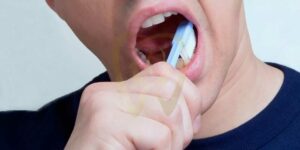Starting your day with a healthy routine can set the tone for a productive day ahead. A common question that often arises is whether it’s best to brush your teeth before or after breakfast. The answer isn’t as simple as one might think and can depend on various factors. In this article, we’ll explore the pros and cons of both approaches, diving into the scientific reasoning behind each. By the end, you’ll have a clearer understanding of the ideal dental hygiene routine that suits your needs.
Are You Supposed to Brush Your Teeth Before or After Breakfast?
It’s a conundrum that has divided dental experts and enthusiasts alike. Let’s delve into the advantages and disadvantages of brushing your teeth before and after breakfast:
Brushing Before Breakfast: The Early Bird Approach
– Fresh Start: Cleansing your mouth of overnight bacteria and plaque before consuming food ensures a fresh start to your day.
– Protecting Enamel: Brushing prior to eating helps protect your tooth enamel from the acidic elements present in some breakfast foods.
– Reduced Bacterial Interaction: By removing bacteria early, you reduce the chances of acids being produced when food particles mix with oral bacteria.
Brushing After Breakfast: The Post-Meal Clean
The post-breakfast brushing routine also has its merits. LSI Keywords: “oral hygiene after eating, dental care routine”
– Food Particle Removal: Brushing after breakfast eliminates any lingering food particles, reducing the risk of bacterial growth.
– Preserving Tooth Sensitivity: Some breakfast items, like citrus fruits, can soften enamel temporarily. Brushing after such foods could harm the enamel.
– Freshening Breath: A post-meal brush leaves your mouth feeling fresh and clean throughout the morning.
Establishing the Perfect Routine
Creating an effective dental hygiene routine involves more than just timing. It’s about combining the right practices for optimal oral health:
1. Choosing the Right Toothpaste
The foundation of any brushing routine starts with the toothpaste you use. LSI Keywords: “selecting toothpaste, fluoride benefits”
– Opt for a toothpaste with fluoride to strengthen enamel and prevent cavities.
– Consider toothpaste designed to address specific concerns, like sensitivity or gum health.
2. Selecting the Ideal Toothbrush
Your toothbrush plays a crucial role in maintaining oral health. LSI Keywords: “toothbrush bristle type, electric vs. manual toothbrush”
– Opt for a toothbrush with soft bristles to prevent gum damage.
– Electric toothbrushes can provide a more thorough cleaning compared to manual ones.
3. Mastering Brushing Techniques
Proper brushing techniques are essential for effective cleaning. LSI Keywords: “correct brushing method, circular motions”
– Hold your brush at a 45-degree angle and use gentle circular motions.
– Spend at least two minutes brushing to ensure thorough cleaning.
4. Timing Matters
Whether you choose to brush before or after breakfast, timing matters. LSI Keywords: “ideal brushing time, morning dental routine”
– If brushing before breakfast, do it as soon as you wake up.
– If brushing after breakfast, wait at least 30 minutes to allow your enamel to recover from acidic foods.
5. Don’t Forget Your Tongue
Your tongue harbors bacteria too, so give it attention. LSI Keywords: “tongue scraper, oral bacteria”
– Use a tongue scraper to remove bacteria and keep your breath fresh.
FAQs About Your Morning Dental Routine
Is it better to brush your teeth before or after breakfast?
Both approaches have merits, but brushing after breakfast might be more suitable to avoid enamel damage from acidic foods.
Can I use mouthwash instead of brushing?
Mouthwash can’t replace the physical action of brushing, but it can complement your routine by killing bacteria.
How long should I wait after breakfast to brush my teeth?
If you’re brushing after breakfast, wait at least 30 minutes to protect your enamel.
What if I have a really acidic breakfast?
If your meal is acidic, it’s advisable to wait before brushing to prevent enamel erosion.
Should I brush my teeth for a specific amount of time?
Aim for at least two minutes of brushing to ensure a thorough clean.
Can I brush my teeth too hard?
Yes, aggressive brushing can harm your gums and enamel. Use gentle pressure and soft bristles.
In the eternal debate of whether to brush your teeth before or after breakfast, the answer depends on your individual habits and dietary choices. Both options have their merits, and understanding the science behind them empowers you to make an informed decision. Remember, beyond the timing, your brushing technique, toothbrush, and toothpaste choices play pivotal roles in maintaining a healthy smile. So, embrace a dental routine that aligns with your preferences and ensures a confident start to your day.




